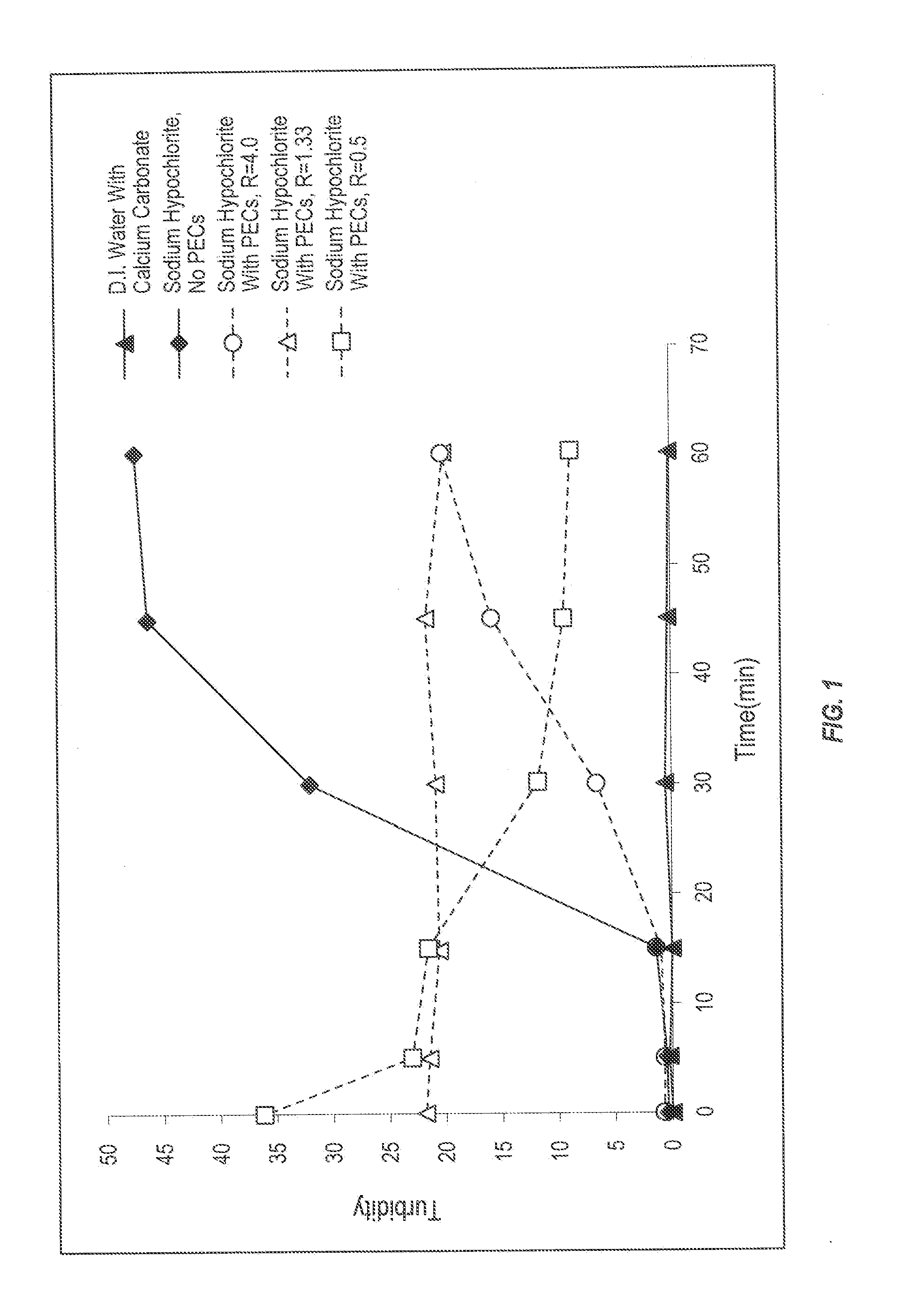Methods of making and using precursor polyelectrolyte complexes
- Summary
- Abstract
- Description
- Claims
- Application Information
AI Technical Summary
Benefits of technology
Problems solved by technology
Method used
Image
Examples
example 1
PEC Precursor Solutions Comprising Poly(diallyldimethyl ammonium chloride) (DADMAC) and Poly(acrylic acid) (PAA) and DLS Characterization of PECs Produced by Dilution
[0113]Table 1 summarizes the compositions of several PEC precursor solutions in which the R value was varied from significantly less than 1, to 1.33 and to significantly greater than 1. In addition, the compositions were designed to have acidic pH levels, in order to be compatible with diluents comprising sources of hypochlorite ions such that the final aqueous solutions could, if desired, comprise hypochlorous acid.
[0114]The PEC precursor solutions comprising DADMAC and PAA were prepared in the following manner. An aqueous solution of DADMAC (40% polymer actives) was weighed and dispensed into a glass beaker followed by the appropriate volume of water required to achieve the desired total polymer concentration. This solution was thoroughly mixed using simple agitation. Finally, an aqueous solution of PAA (26% polymer a...
example 2
Compositions of PEC Precursor Solutions and DLS Characterization of PECs Produced by Dilution Comprising Chitosan (a Natural Polymer) and Poly(Acrylic Acid) (PAA)
[0120]Details of exemplary PEC precursor solutions comprising a natural polymer (chitosan) and PAA at R values both less than and significantly greater than 1.0 are summarized in Table 2.1. In order to ensure the solubility of chitosan in the precursor solutions, the pH was adjusted to be acidic, which causes the formation of cationic charges on the amine groups of the chitosan. Since PAA is soluble in aqueous solutions in its protonated acid form, the PECs precursor solutions were clear and free of coacervates or precipitates.
[0121]Precursor solutions of chitosan and PAA can be prepared in a manner similar to PAA and DADMAC solutions. Chitosan, when sourced as a solid powder, may first be dissolved into an acidic aqueous stock solution (e.g., hydrochloric acid or citric acid). In this example, the chitosan stock was then d...
example 3
PEC Precursor Solutions Comprising Lupasol and Poly(Acrylic Acid) (PAA) and DLS Characterization of PECs Produced by Dilution
[0126]Precursor solutions of Lupasol (a synthetic polymer) and PAA can be prepared in a manner similar to PAA and DADMAC solutions. The appropriate amount of Lupasol was first diluted into an acidic solution of sodium chloride and then combined with an appropriate amount of an aqueous solution of PAA. Mixing with simple agitation completed the preparation. Diluted solutions comprising PECs were prepared by adding a volume of the precursor solutions into an appropriate volume of water required to reach the ultimate total polymer concentration desired. Simple mixing during the dilution was achieved via a magnetic stirbar. Once the solution has been thoroughly mixed, the pH can be adjusted by adding acid or base depending on the desired pH value. Precipitation of the precursor solutions can be avoided by maintaining an acidic pH. In this example, no precipitates ...
PUM
| Property | Measurement | Unit |
|---|---|---|
| Molar density | aaaaa | aaaaa |
| Molar density | aaaaa | aaaaa |
| Molar density | aaaaa | aaaaa |
Abstract
Description
Claims
Application Information
 Login to View More
Login to View More - R&D
- Intellectual Property
- Life Sciences
- Materials
- Tech Scout
- Unparalleled Data Quality
- Higher Quality Content
- 60% Fewer Hallucinations
Browse by: Latest US Patents, China's latest patents, Technical Efficacy Thesaurus, Application Domain, Technology Topic, Popular Technical Reports.
© 2025 PatSnap. All rights reserved.Legal|Privacy policy|Modern Slavery Act Transparency Statement|Sitemap|About US| Contact US: help@patsnap.com

